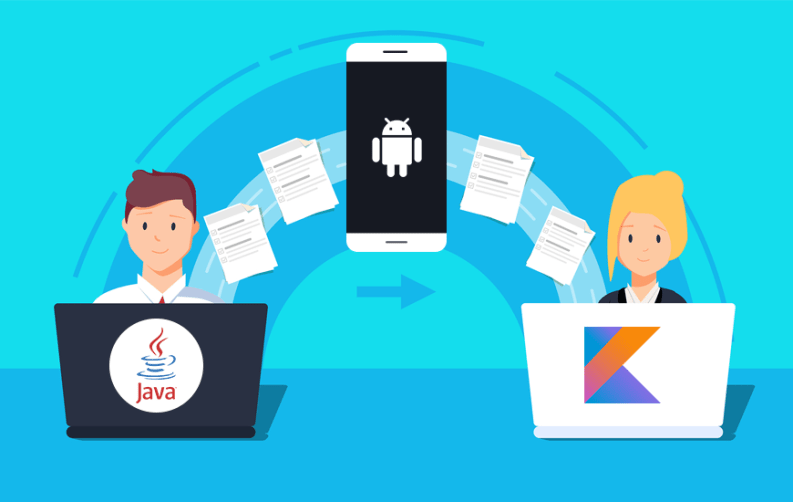
Kotlin, a new programming language, is taking over traditional app development programming languages. Ever since Google made the announcement of adding Kotlin as an official Android app development language hence, providing a ton of support to the Kotlin community. So, is it worth performing Java to Kotlin migration on your Android application?
In this article, we will be answering this migration question while also covering many different aspects of what exactly happens in the process of migrating an Android app based on java to Kotlin. At present, a significant amount of mobile app developers think of Kotlin as the first viable alternative to the Java programming language for Android platforms.
In this case, you are still new in the field of android app development and haven't heard much about Kotlin. Then we would highly recommend you to get your basics cleared with the help of this article on 'Basic Syntax.'

The programming language Kotlin can be referred to as a modern open-source JVM language that was developed by JetBrains. Some of the huge organizations that are currently using Kotlin language are Trello, Google, Square, Pinterest, Kickstarter etc.
Need for Java To Kotlin Migration
For the Android development platform, Kotlin delivers an impressive modern programming experience without the need for involving any third-party software. When an app developer is involved with any third-party tool.platform, there's always a risk of including those Java features that are not supported by the Android toolchain.
Although programming languages like Java and Kotlin are similar in some context, but they are still worlds apart. For instance, Kotlin is highly interoperable with all the existing Android languages. And it can also be easily integrated with Android Studio, which no other language can except Java. You can learn more about this on 'Why Kotlin Is Preferred Language For Android Development?'

Initiating Java To Kotlin Migration Process
To start the java to Kotlin migration process, a majority of people first begin from their tests and then move on towards their modules. But this is not a hard and fast rule that is meant to be followed, the android app developer can directly select any random Java file that he/she wants to convert to Kotlin.
Here are the main steps to convert Java to Kotlin:
- Start to convert files, one by one, via “⌥⇧⌘K”, make sure tests still pass.
- Move over to the Kotlin files and make them more idiomatic.
- Repeat the step 2 until you convert all the Java files.
Below are the common issues faced while converting Android App from Java to Kotlin converter:
- The companion will add an extra layer.
- There are no argument captors.
- If the Java method starts with getX(), the converter looks for a property with the name X.
- 'git diff' issue is caused when two android app developers are working on the same Java file and one of them converts it to Kotlin, it will require rework.
- Generics are difficult to get it right during the first time.
- TypeCasting will occur due to Interoperability.
For example, The Method names will start with getting
This is the Java Class -
public interface DemoService { @GET("posts") Observable getDemoResponse(); @GET("categories") Observable getDemoResponse2(); } Now, the converted Kotlin class will be expecting parameters, demo response and demoResponse2. Because they are interpreted as the getter methods a lot more issues will be surfaced in the code due to this:
interface DemoService { @get:GET("posts") val demoResponse: Observable @get:GET("categories") val demoResponse2: Observable }
Things To Remember During Migration Process
Here are some important points to remember during the migration of Java to Kotlin for an android app:
- 'annotationProcessor' must be replaced by 'kapt' in build.gradle
- Make sure you configure the tests to mock final classes
- If you are using data-binding, include: 'kapt com.android.databinding:compiler:3.0.0-alpha8'
- Use @JvmField annotation if you want to use ButterKnife 'InjectView' and any testRule field with @Rule annotation
- @JvmField is used to rescue while using ButterKnife @InjectView and Espresso @Rule
For example: In the below mentioned Kotlin code, we have eliminated all the ‘!!’
class DataManagerTest { @Rule @JvmField val overrideSchedulersRule = RxSchedulersOverrideRule() @Mock lateinit var mockPokemonService: PokemonService private lateinit var dataManager: DataManager @Before fun setUp() { dataManager = DataManager(mockPokemonService) } @Test fun getPokemonCompletesAndEmitsPokemon() { val name = "charmander" val pokemon = TestDataFactory.makePokemon(name) `when`(mockPokemonService.getPokemon(anyString())).thenReturn(Single.just(pokemon)) dataManager.getPokemon(name).test().assertComplete().assertValue(pokemon) } }
Final Thoughts
Now, the main question that arises at this point is, ‘Should You Convert Your Android App From Java To Kotlin?’
There's no denying that Kotlin is an amazing programming language that is taking over the mobile app development industry for both Android and iOS. For example, 'Swift Vs. Kotlin: Similarities And Differences Every Developer Should Know' article is a must-read for iOS developers who wish to keep up with the trend.
To be honest, migrating your existing Android codebase to Kotlin is an exciting process that also requires some patience to pull it off successfully. But in the end, the overall outcome will be worth the effort.
The Android app developers can also reduce their extra efforts by ensuring that they already have a couple of unit tests in your existing application codebase before starting the migration process and porting java.
To stay updated with more such informative articles, click on that ‘Subscribe’ button and be a part of the MobileAppDaily family.

Sr. Content Strategist
Meet Manish Chandra Srivastava, the Strategic Content Architect & Marketing Guru who turns brands into legends. Armed with a Masters in Mass Communication (2015-17), Manish has dazzled giants like Collegedunia, Embibe, and Archies. His work is spotlighted on Hackernoon, Gamasutra, and Elearning Industry.
Beyond the writer’s block, Manish is often found distracted by movies, video games, AI, and other such nerdy stuff. But the point remains, If you need your brand to shine, Manish is who you need.













